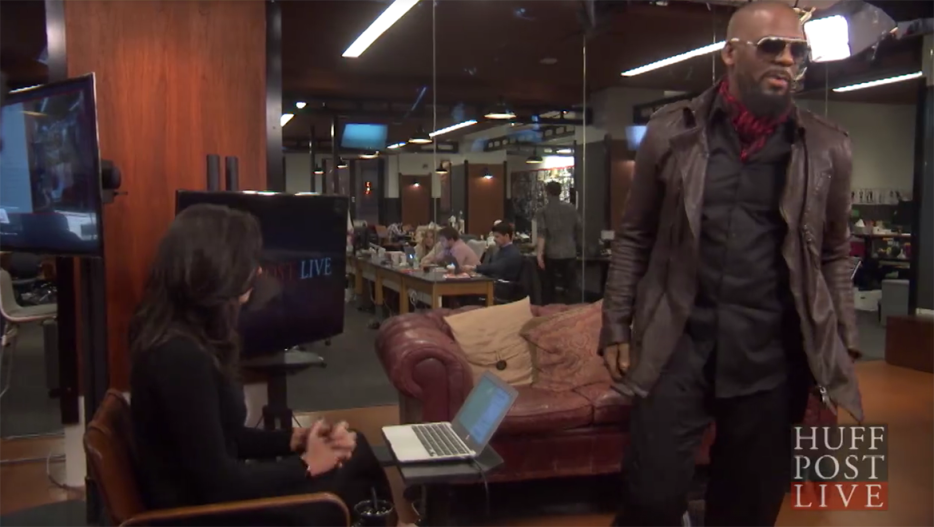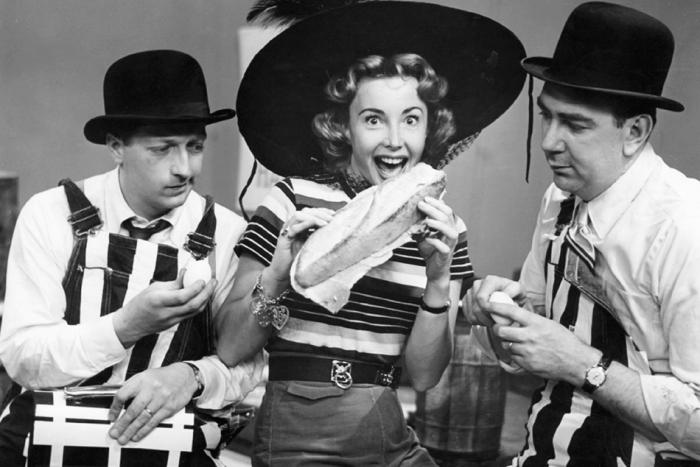On December 21st, 2015, R. Kelly appeared on HuffPost Live, apparently unaware that his involvement in pedophilia might be a topic of discussion. It’s not surprising, since an unhealthy number of people seem to suffer from what music writer Jim DeRogatis called “cultural amnesia” in order to sing along to Kelly’s Grammy-winning single “I Believe I can Fly” or dance to “Step in the Name of Love” at a backyard barbecue.
DeRogatis was the chief pop music critic at the Chicago Sun-Times when he first heard rumors about Kelly’s involvement with underage black girls, including a settled lawsuit in 1996, brought by a woman who alleged that Kelly had sex with her when she was only 15. DeRogatis published his first piece on Kelly in 2000, reporting that the singer preyed on young women, parking his car in the lots of urban high schools, waiting for students to recognize him. In 2002, someone dropped a videotape off at DeRogatis’s home. On the recording was a man who “closely resembled” Kelly, having sex with what was later confirmed to be a 15-year-old girl. Despite “dozens of civil lawsuits and out-of-court settlements with underage girls who claim they had sexual relationships with him that left them physically and emotionally damaged,” most of Kelly’s legal troubles came from that tape, wrote DeRogatis in the Village Voice. The settled lawsuits describe Kelly getting his victims to recruit other underage black girls for group sex, unwanted pregnancies and ensuing abortions. Once these girls reached the age of consent, they were dumped.
DeRogatis was one of the very few who was regularly reporting on Kelly’s actions. Victims and their families reached out to him for support. “I will never forget sitting with a girl who showed me the scars where she slit her wrists when her relationship with Kelly ended,” he wrote in the Village Voice article. But DeRogatis says mainstream media ignored the accusations.
Seven years later, the Huffington Post’s planned 25-minute segment on the daily video stream was shortened to 17 when host Caroline Modarressy-Tehrani asked Kelly about a video message he posted, chiding his fans for not supporting his latest album, 2015’s The Buffet (which sold poorly). Modaressy-Tehrani wondered if Kelly thought the low sales were due to the prior sexual abuse allegations, and not, as Kelly asserted, because his fans were not supporting black music artists. “Fuck that,” he responded, visibly irritated. “You can’t satisfy everybody.” Modarressy-Tehrani didn’t let up, and an argument ensued. Kelly attempted to demean the host in order to avoid addressing the fact that his marriage to a 15-year-old (singer Aaliyah, who died in 2001), and his arrest and later acquittal of 14 counts of sexual assault charges against African-American teenagers might be a topic of interest to viewers. He walked off the set.
A week later, though, he performed two songs on Good Morning America, and despite lackluster albums sales, his upcoming concert tour is almost sold out. In January, GQ published a feature-length interview with Kelly, boasting in its introduction that he had “agreed to speak about his life without restrictions.” Instead, readers were offered the same history that Kelly wrote about in his 2012 memoir, Soulacoaster, and a lot of “double-speak” to avoid directly answering questions about his previous actions.
In the past year, there has been a concerted effort to raise online awareness concerning black women’s marginalization in popular culture. A white police officer was convicted of 18 counts of rape, sexual battery, forcible oral sex and sodomy on black women. Sexual assault charges were laid against comedian Bill Cosby from one of his fifty-seven accusers. R. Kelly’s promotional activities touched a wound that he probably thought was healed. Many journalists have been questioning their allegiance to the “Pied Piper” of R&B. But many fans, especially those from the younger generation, seem to be immune to the criticism.
An inferiority complex, due to patriarchy and black subordination, led to black women sacrificing their bodies and their dignity to support black men.
Disreputable actions by public figures are often ignored in order to keep the illusion of what they create alive. Just this week, rapper Kanye West tweeted “BILL COSBY INNOCENT !!!!!!!!!!” Because of a history of inconsequential online ramblings, West’s tweets are often relegated to “boy cries wolf” status by many, but in this case some, such as actor Sarah Silverman, didn’t take kindly to the comments. Silverman quickly responded with, “Kanye!! You can’t be for real. FIFTY WOMEN. With nothing to gain thanks to a statute of limitations ON RAPE. Oy.”
In her 2013 article, “No Shame: I’m Still an R. Kelly Fan And This is Why,” Hello Beautiful editorial director Leigh Davenport wrote about a private, all-women (she emphasized the guests were all “highly sophisticated and educated”) listening party she hosted for Kelly’s 2013 album, Black Panties. “R. Kelly may also be a freak-a-leak, but that’s not really any of my business,” she wrote. “[N]ever in the history of our time has great art been separated from vices, indulgences and deviancy. I’m pretty much as pro-Black, pro-woman as you can get, but I’m also tired of being asked to be simple.” A week later, Davenport decided that her flattering post about Kelly’s music might have been written in haste. After reading DeRogatis’s Village Voice article that discussed interactions with Kelly’s Chicago-based victims, she retracted some of her statements in an interview with News One. “I predicated a lot of my first opinion on ignorance. I realized and tried to make it quite clear I knew I was living in a glass house.” But not everyone felt the same way. One response on the Facebook page of Terrell Starr, the journalist who interviewed Davenport about her change of heart, asked, “Don’t the parents of these girls warrant some blame?” A woman commenter added, “Bottom line, the people involved has [sic] went on with their life and got over it. Why are there people still mad?”
*
There has always been a sense of shame surrounding sex and sexual violence in African-American communities. The result of 400 years of sexual abuse and other dehumanizing efforts at the hands of white slavers was twofold. It created a generational inheritance of sexual repression and sexualized stereotypes that began when white Europeans first travelled to West Africa and were captivated by the semi-nudity of African women, the common practice of polygamy, and the seemingly provocative tribal dances. This was used to position African slaves as not being able to control their sexual urges, which, coupled with general assumptions about their inferiority, was later used as a justification for institutional and systemic discrimination, such as State-sponsored sterilization to minimize population growth.
Sex outside of the marital bed was seen as shameful across cultural lines, but within black communities, it was emphasized that sexual proclivities would further hinder black progress in the eyes of whites. When girls experienced abuse, families feared that the victims were the ones who would bear the brunt of negative perception. Fear of the white gaze also brought a level of distrust, as did harsh treatment of black men by the authorities. Together, this led to reluctance in notifying authorities of sexual abuse by family members or family friends for fear not only of the reaction of authorities but also that if the male perpetrator was removed, it would place the family in financial jeopardy. An inferiority complex, due to patriarchy and black subordination, led to black women sacrificing their bodies and their dignity to support black men. “There's an old saying in the African American community: Black women raise their daughters and love their sons,” writes Gayle Pollard-Terry for the Los Angeles Times. “A legacy of the atrocities of slavery, it signifies a communal protectiveness of black men, from the coddling of toddling boys to a reluctance to report rape and incest.” This often leads to cognitive dissonance and the resulting inaction when addressing sexual abuse against black women.
Nearly 60% of black American girls have experienced some form of sexual abuse.
“My youngest daughter [told me] something happened to her, but because [the abuser] was someone that I liked, I didn’t believe her,” admitted actor and comedian D.L Hughley during a recent interview with Sirius FM about Bill Cosby. “And I [can never] get that back. I’m supposed to protect her, but I’ll never [forgive myself] that she told her father and he didn’t do nothing about it.”
Black celebrities who represent wholesome images that defy racial and class stereotypes are extremely crucial within black communities, as they prove that despite the legacy of racial injustice, blacks can make it. “Cosby and Kelly represent success, which counters the internalized belief in public eye that black people are not successful,” says Sergio Mims, the Chicago-based film programmer and contributing editor of Shadow and Act. “It’s very rare to see a successful black person in the media, but once there is, and something goes wrong, they blame it on a ‘white conspiracy’ that's bringing them down.” Blaming a celebrity’s downfall on racism serves as not only a weak defense to dismiss alleged sexual abuse, but also pushes the real problem under the rug, so people do not have to acknowledge that there are predators in their families or in their communities. He also adds that “Shame is part of it, too … Dick Gregory had a famous joke. He said, ‘I know how the government can get people to stop smoking. They should say that if you smoke cigarettes, you’ll turn black.’ That will get people to stop—including black people,’” Mims laughs. “What he was trying to say was that a lot of black people suffer from self-hatred and have ingrained racial stereotypes, and in the case of Kelly supporters, young black women tend to be the target of that hate.”
Black women are not immune to hating each other for the same reasons. Davenport’s initial article suggested it might have been acceptable for educated, “sophisticated” women to enjoy the hyper-sexualized Black Panties, they are socially and economically distant from the “thot” or the “ratchet” behavior of a woman who would allow her body to be defiled for money or fame. Therefore, Davenport wasn’t concerned that Kelly had been caught on camera in a sex tape—that she was too classy to view prior to her hosting a party for an alleged sex offender—featuring an underage girl who most likely did not consent to a mouthful of urine.
Kelly’s longevity and success within an industry in which African-American performers often have to work twice as hard to receive half the public recognition as their white counterparts serves as a sense of pride for many. “I know they said no red cups y’all, but this man has done more for the blacks than anyone,” exclaimed Erykah Badu when she introduced Kelly on the 2015 Soul Train Awards. Badu has built a reputation for being an ardent feminist, so her public support for the artist—even though she could have been parroting what was written on a teleprompter—was received with shock. “If there is a hell, I hope R. Kelly falls into it face first into a fire-lake of his own urine,” declared VH1’s Michael Arceneaux, who couldn’t understand how Badu could support him.
*
A week after Kelly’s appearance, HuffPost Live hosted a panel discussion. A selection of viewers Skyped in to talk about Kelly’s actions. More than one viewer mentioned that because of his longevity (Kelly first gained prominence in the early 1990s as part of the popular “New Jack Swing” craze), and his ability to release provocative club bangers and heartfelt and wholesome melodic anthems, his listening demographic now spans three generations. “I grew up listening to R. Kelly. He was playing at every family barbeque,” said one young black female supporter. “His music is a staple in our house.” Nostalgia brings loyalty and because of his musical duality, makes it easier for older black fans to revel in the wholesome parts.
But many of the online supporters of Kelly are young. They were raised with a computer in their homes, and their pubescent years were spent on MySpace, and eventually Twitter and Facebook. They are able to gather information through a Google search. The Internet can provide a dissenting view: when you type “R. Kelly” into a web search engine, articles written by concerned cultural critics like Britni Danielle will pop up. “Nobody matters less to our society than young black women,” Danielle writes, referring to a study that concludes that nearly 60 percent of black American girls have experienced some form of sexual abuse, Danielle urges people to take the ten dollars they might spend downloading Kelly’s latest album and make a donation to one of the ten organizations she lists that assist sexual abuse and incest survivors. She writes: “this issue is BIGGER than him.”






